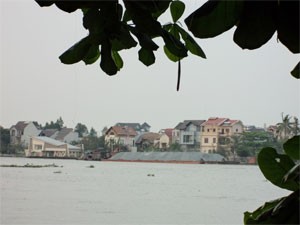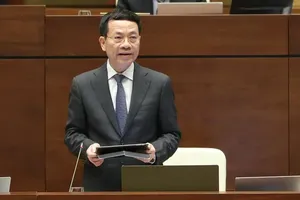The Law on Land 2003 providing regulations on land management needs to be amended as it makes investors and even officials confused due to too many bylaws, experts said.

Pham Dinh Cuong, head of the Ministry of Finance's Bureau of Public Property Management said that even he himself could not remember which regulations remained valid or did not.
Pham Khoi Nguyen, Minister of Natural Resources and Environment, said the Law on Land 2003 confused property investors with too many bylaws.
“Some legal regulations on land use remain vague. Some conflict with regulations of the Law on Investment, Law on Construction, Law on Residential House and even the government’s decrees,” said Dao Anh Kiet, director of the Ho Chi Minh City Department of Natural Resources and Environment.
Nguyen Huu Nghia, deputy director of the Hanoi Department of Natural Resources and Environment, proposed to add more regulations on the state’s budget raised from lands, including the deficit of the land rentals from projects on road expansion and residential zones.
Many experts said at a conference on legal implementation of land management that there were problems in the land law that should be amended, including the role as a landowner of the government, the additional value of property from the government’s investments and business equitization related with the land rights.
Le Hoang Chau, chairman of the HCMC Real Estate Association, suggested extending the duration of agricultural land use to 50 years from 20 years.
The introduction of Land Law 2003 formalised and synchronised the different legal regulations on the auction of land use right, according to Vietnam News.
However, as there has not been detailed uniform guidance on the application and implementation of the auction of land use right, there are still issues based on the provincial regulations, which are outdated and inadequate.
Before Land Law 2003, in some big cities such as Ha Noi and HCM City, local authorities had promulgated regulations on the auction of land use right in projects of constructing houses for sale and lease, but such regulations were not strictly followed.
After the Land Law local authorities have revised regulations to pull them more in line with the new Land Law and implement and supervise the implementation of such regulations more strictly. However, in most other cities and provinces, similar detailed guidance has not been promulgated.
The auction of land use right has made a great contribution to the administrative reform in the activities of land allocation, land leasing, land resumption, and site clearance, which have, for long time, been pending issues, causing obstacles to many investment projects. In addition, the land allocation and leasing through auction will help to create a more level playing field for all the economic sectors, which helps to attract more investment capital from all groups of investors.
In some provinces, there have been regulations on the organisation of the auction of land use right for the purpose of generating capital for infrastructure development, but these have caused too many difficulties in understanding for investors, especially foreign ones.
In addition, there has been minimal legal regulations guiding the application and organisation on activities of using land for constructing houses for sale and lease, and especially for constructing production and business locations.
The situation is worse for using the land to construct production and business locations as there is not yet any legal regulation guiding this activity.
This problem has blocked many investments. Before Land Law 2003, investors could look for a site in a developed industrial zone, or approach a commune’s authority for a piece of land, which would be re-zoned from agricultural land to industrial land according to the regulations of the province).
After completing the complicated administrative procedure, the investor would have gained a lease contract and land use right certificate from the competent authority and they would be able to start the compensation work.
If land is planned properly and the development of industrial zones satisfies investor demand for sites then there would be no need for investors to approach local authorities to apply for a piece of land.
























